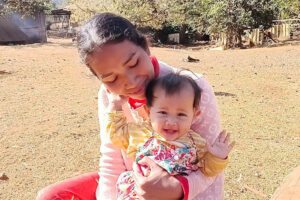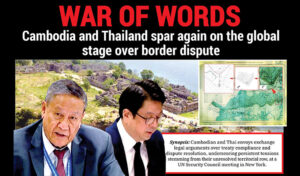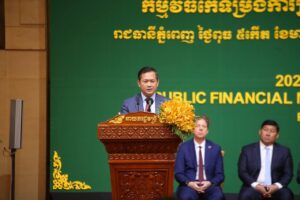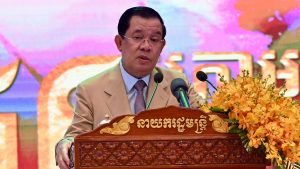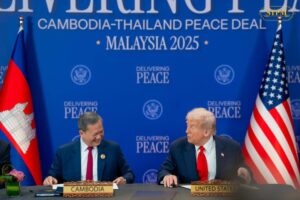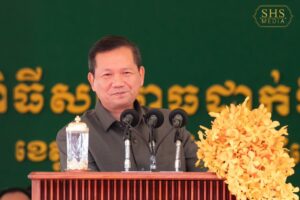(Video) Selected Comments of Samdech Thipadei Hun Manet, at the 80th funding anniversary of the Cambodian National Police [Unofficial Translations]
[2]
(1) The evolution of a country to a modern society involves issues to tackle with
As a poor country, Cambodia was surrounded by sanctions and isolation from the outside world in the past. It has evolved and is now progressing in all areas. The evolution of a country, whether Cambodia or anywhere else, from a society with problems to a modern society, where people’s lives are more prosperous and materially better, may involve some issues to tackle with […] At the royal plowing ceremony in Kampong Chhnang province, which was attended by Samdech Akka Moha Sena Padei Techo Hun Sen, Samdech Krahom Sar Kheng, Samdech Pichey Sena Tea Banh, there was a discussion about what happened 40 years ago, like in 1985, when there was difficulty in buying rice from the people […] If the situation remained like that, there might not be a problem of cross-border crime because nothing would come in. Secondly, if the people were poor, there would be no gangs riding motorcycles […] If our country restricted the freedom to use technology, there would be no cross-border crime from use of technology […]
(2) The law enforcement forces, especially national police, must ensure legality and a better environment for citizens and/or all institutions in using technology
The rapid development of technology in the world has allowed 99.9% of the population benefit from it and use it in line with the direction of development and for work […] while 0.1% of the population does not use it in a good way, for instance taking advantage of transnational criminal networks. Technology can attack from abroad […] We cannot prevent the 0.1% from taking advantage of technology for illegal benefits and denying the rights and opportunities of the 99.9% population. We must strive to prepare legal standards, policy documents, and other documents to guide the use […] This is a new discipline in which law enforcement forces, especially our national police, must ensure legality and a better environment for citizens and/or all institutions to use technology. At the same time, we must tighten, eliminate the possibilities and opportunities of wrongdoers and bring them into line. This is a task that requires constant capacity building […]
[3]
(3) Integrity, transparency and accountability must be ensured, especially regarding concerned topics of territorial integrity and ethnic conflicts
In this sense, protecting human rights is about protecting the basic rights of people – the right to live in peace, stability and harmony, without worrying about insecurity, social chaos, the right to freedom of expression, the right to practice religion, the right to engage in politics, etc. must be guaranteed within a framework permitted by law. Integrity, transparency and accountability must be ensured, especially on important topics that concern citizens, such as territorial integrity and ethnic conflicts […] wars in other countries are part of it, but the main reason is the loss of trust between people and people, especially the creation of fake news, the use of information that is not true to make fire in people’s mind, causing a rift in trust between the people and the legitimate government, which receives the right from the overwhelming majority of the people’s votes, in accordance with the Constitution to fulfill its 5-year mandate to serve the motherland […]
(4) The law enforcement, especially the national police, must protect peace, stability and security for the people at all costs
There is no place or family that can (meet) all the needs or be perfect in every way. what matters, however, is to maintain a stable environment that allows us to strengthen the positive points and reduce the negative points, according to the law. (The law enforcement forces, especially the national police) must absolutely protect peace, stability and security for the people at all costs. The 17 million people, including those who do not support the government, rely on us (to exercise) the right to express their opinions, the right to engage in political activities in compliance with the law and honesty […] Education and teaching children to avoid gambling, gangs, drug activities is a joint duty of families, schools, each society, each of us, each friend, so as not to reach the fifth stage of the approach (which are taking shower, rubbing off dirt, reflecting oneself in the mirror, taking treatment, and having a surgery) […] This is our participation in fulfilling our duties – a sign of taking up responsibility as a civilized and developed society. Our goal is not developing only to be happy in terms of better life and materials, but also developing responsible mindsets […]
[4]
(5)
I am calling on citizens to be careful in using electrical appliances so that there are no regrets […] Prevention is better than cure or treatment. Please inspect electrical appliances, wires, and turn off power switches of electronic appliances, electrical appliances, lighting, and fuel, especially when traveling away from home […] The construction standards prepared and instructed (by the Ministry of Land Management, Urbanization, and Construction) with the Deputy Prime Minister (and Minister) Say Samal who is here present, has covered everything, whether it is preparing the gas system or the electricity system, has in fact contributed to the authorities’ effort in tackling this issue. If prepared correctly, and if it catches fire, it will not spread quickly, and it gives us an opportunity, time, and space to deal with it in a timely manner. When a water truck comes to rescue, it will reach destination. If you build or place things, however, blocking the path, it will be difficult to go in and help […]
[5]
(6)
Attention must be paid to the training of the force […] The Royal Police Academy is a key institution, a unit for (increasing such capacity). Training from school must ensure standards. After the graduation, the trained force perform duties according to the standards or actual conditions at the base, but there must be a standard, especially for police officers. They must be aware of legal affairs and law enforcement […] We have a lot of collaboration, though. As you can see here today, there are ambassadors and leaders, especially HE the Minister of Public Security of Vietnam and the Ministry of Public Security of Laos are (also here present with us) […] No one lives in isolation. Sometimes, when our national police go for training in other country, some accused us of serving that country’s interest. When they see the police force of other countries learn Khmer language, some say they are getting themselves ready to boss us […] Actually, wherever you go to study, in whatever country, we are still the Cambodian National Police, who work to protect the interests and sovereignty of the Cambodian nation. This is the truth. Please do not paint color to our officers or our forces, whether they are the police, the army or anyone else […]
[6]
(7) At present and even in the past, no decision made to sell PPIA to a private company
Now regarding the issue of the Pochentong (Phnom Penh International) Airport (PPIA). These days, there has been a lot of talk about selling this airport. Some people say that the government sold this airport to a private company 15 years ago. Where did you get this information? […] 15 years ago, we did not even plan to build a new airport, let alone sell the old airport to anyone […] Only two people have the right to decide on the exchange – Samdech Techo, who was the former Prime Minister in the previous term, and I, the Prime Minister in this term. Neither of us knew about the plan to sell Pochentong airport (to anyone at any time) […] Let me clarify in short here and now that, currently and even in the past, there has never been a decision to sell this airport to a private company. The short answer is “none” […]
(8) The past and current owner of the airport is the Secretariat of Civil Aviation
In the previous term, we had a committee – called the Inter-Ministerial Committee for the Legal Review of Existing Agreements, headed by (Former Deputy Prime Minister and Minister of Land Management, Urban Planning and Construction,) HE Chea Sophara, to prepare new agreements for the Phnom Penh and Sihanoukville International Airports. The committee’s job was to negotiate the rights to operate, not to exchange the airports. Since 1990, we have had an exclusive contract on our airport to the French concessionaire SCA for the right to operate, but not to own. The current and past owner of the airport is still the Secretariat of Civil Aviation, the state entity. The SCA has only the right to operate […]
(9) Entire management of PPIA transferred to State Secretariat of Civil Aviation and the armed forces help protect the state property at the old airport
My decision on April 28th had two points. The planned transfer of operations is scheduled for 12:00 p.m. on July 9th into 10th. This transfer means closing the old site. The aircraft will land at a new site (and) the air traffic controller will go to a new location […] The point is, who is responsible (of the PPIA) after that? I have agreed to two points requested by the State Secretariat of Civil Aviation. Firstly, transfer the entire management of the airport to the State Secretariat of Civil Aviation. Secondly, the armed forces help protect the security of state property at the old airport, including patrolling the area, plus protecting the site […]
(10) Three principles applied on PPIA – preserve its historical value; turning it into an asset for maximum use by Cambodians; and ensure this asset remains a state property
If not sold now, will we sell it or not? The answer is “no”. The principle we are currently planning is to keep this place (the old airport) in its current state and prepare it as a reserve in case of an emergency landing under the control of civil aviation. We have studied one or two other options in case in the future we cannot keep it as an airport – according to three principles – Firstly, preserve the historical value of this location, the legacy of Preah Borom Ratanak Kaod, which has served the transportation sector for decades […] Secondly, find an option that provides benefits to the public, without allowing it to go to private ownership, and turn it into a place or asset that Cambodian citizens, especially Phnom Penh residents, can use to the maximum […] and thirdly, use the formula and option as a condition for sustainable management and use, but ensure that this asset remains a state property, not be given to private ownership […]
(11) As long as the CPP leads the country, nothing shall be done to PPIA in disregard of the three mentioned principles
Since Samdech Techo, the former Prime Minister, did not agree to allow transfer (the PPIA) to the private sector, and I, the current Prime Minister, still uphold this decision, no one has the right to do it otherwise […] the Royal Government gave no such principle to do so. There was none from the past, there none at present, and there will be none in the future. If any private person wants to claim this site for development, I am telling him/her to go somewhere else. This site is left for the nation and the people, as the public property for the future […] I said this when I am the Prime Minister (of the country). If another (political) party comes, (what they will decide with it,) I do not know. As long as I am the Prime Minister, and the People’s Party leads the country, we will still ensure that this site will not be affected in anyway other than applying the three principles that I mentioned […]./.

